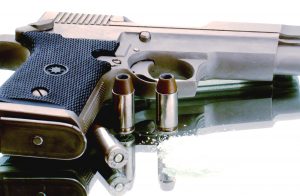Charlotte Criminal Lawyer Brad Smith answers the question: “What is the difference between a misdemeanor and a felony?”
The U.S. Constitution and amendments provide citizens with the right to bear arms. Although you generally have the right to own a gun, there are many federal and state laws that govern gun ownership. You must abide by these laws or you could face charges or have your gun taken away. A person could face gun charges alone or associated with another crime. For instance, someone might be charged with using a weapon while committing a crime. Gun charges may be misdemeanors or felonies, depending on the specific circumstances. If you are charged with a gun crime it is advisable to seek legal guidance from a criminal defense attorney.
 Common Weapons Charges in North Carolina
Common Weapons Charges in North Carolina
There are some common gun charges that occur with some frequency. Some of these include:
- Concealed Weapon: Only someone with a concealed firearm permit is allowed to carry a concealed weapon. You could be charged with a Class 2 misdemeanor if this is your first such offense. A subsequent charge would classify as a felony.
- Felon in Possession of a Gun: A convicted felon is not allowed to own or possess a firearm. A felon cannot purchase, own, or have a gun in his possession. The charge is a Class G felony.
- Possession of Gun on School Property: It is illegal to have a gun on school property, either concealed or out in the open. Schools include elementary through college level and include extracurricular activities. The charge for possession of a gun on school property is a felony.
- Possession of Gun by Someone With a Domestic Violence Order: If you have a domestic violence order you are not allowed to own, possess, or purchase a gun for the duration of the order. You may also not possess ammunition. If you violate the law you could be charged with a Class H felony.
In addition, possession of a gun during the commission of another crime is a separate charge. If you discharge the weapon, additional charges may apply. It is also illegal to remove or tamper with the serial number of a gun, to sell a gun to a child, and to sell or provide a weapon to a convicted felon.
Penalties for Gun Charge Convictions
The potential penalties for gun charge convictions vary greatly, depending on the specific details of the case. A gun charge may be a misdemeanor or a felony. Generally, misdemeanor charges apply when the gun was not used. In situations where the firearm was discharged, you will typically face felony charges. Punishments may include a jail sentence, a probationary period, and community service.
Misdemeanor Conviction
- Class 1 Misdemeanor 1 to 120 days
- Class 2 Misdemeanor 1 to 60 days
- Class 3 Misdemeanor 1 to 20 days
Felony Conviction
A felony gun charge conviction is more complex because of the additional circumstances that may be present.
- Class D Felony 51 to 128 months
- Class E Felony 20 to 50 months
- Class F Felony 13 to 33 months
- Class G Felony 10 to 25 months
- Class H Felony 5 to 20 months
- Class I Felony 4 to 20 months
The judge has some discretion for penalties. There are many mitigating factors as well as aggravating factors that will be reviewed when determining the penalties.
Contact Arnold & Smith, PLLC
Gun charges are serious and a conviction could result in severe penalties and a criminal record. Therefore you will want to fight gun charges with help from an experienced criminal defense attorney. Please contact us today to get a phone, video or in-person consultation by calling at (704) 370-2828 to speak with our detail-oriented and well-versed lawyers with offices in Charlotte, Lake Norman, and Monroe, please contact Arnold & Smith, PLLC today or find additional resources here.
The criminal defense attorneys at Arnold & Smith, PLLC make it their mission to zealously defend their clients on a wide range of criminal matters at both the state and federal levels. These matters may include any charge from traffic offenses; DWI/DUI; drug charges (from simple possession to possession with intent to distribute and trafficking); gun permit denials; weapons offenses; and property crimes (larceny, breaking and entering, robbery, fraud, embezzlement, white collar offenses); to sexually related offenses (indecent exposure; sexual assault, crimes against nature, removal from sex offender registry); and violent crimes (domestic violence; assault; manslaughter; homicide, murder). Other legal issues that Arnold & Smith, PLLC criminal clients may be facing include restraining orders, restraining order and probation violations, expungements; appeals; and immigration issues related to criminal charges. Our criminal defense attorneys are passionate about ensuring that individuals empower themselves by being informed about their constitutional rights, and stand at the ready to fight in the defense of those facing criminal charges.
Source:
https://www.law.cornell.edu/constitution/index.html
https://www.law.cornell.edu/wex/concealed_weapon
Image Credit:
https://www.freeimages.com/photo/gun-2-1427081
See Our Related Video from our YouTube channel:
https://www.youtube.com/user/ArnoldSmithPLLC/videos
See Our Related Blog Posts:
Gun Control Laws in North Carolina
 Charlotte Criminal Lawyer Blog
Charlotte Criminal Lawyer Blog


